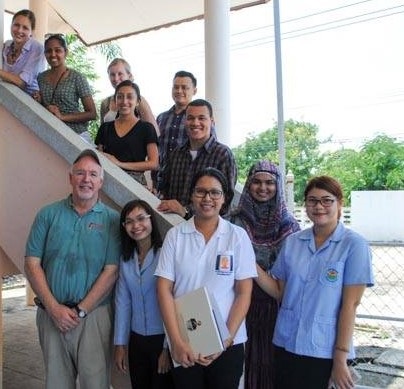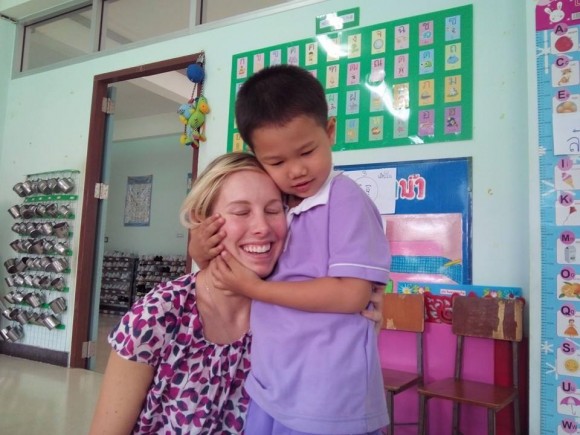
As part of the ISL course began by Prof. Mark Robson (front row, left), the Rutgers students met with Public Health Faculty from Chulalongkorn University and the medical staff at the Rural Health Clinic in Rangsit, Thailand.
Mark Robson, professor of plant biology and pathology, has been working in Thailand for 20 years. His activities have included being a Fulbright Senior Scientist, teaching risk assessment under a program funded by the Asian Development Bank and training young environmental health scientists under the NIH-funded Fogarty Center. Because of his deep association with Thailand, Robson was motivated to develop a new International Service Learning Course (ISL), a month-long course in July that was offered for the first time in the summer of 2014 in Bangkok. The class included a service component in local schools for underprivileged children in Bangkok along with cultural and educational activities. One day-long field trip involved a visit to a rural farming location where Robson conducts research on the effects of pesticides on children living in the rice-growing area known as Rangsit. As part of that trip the students visited the original Thai capital, Ayutthaya.
Public Health major Veronica Walentowicz (SEBS 2015) shares her thoughts and experiences on this ISL course in her own words below.
Summer 2014 – Bangkok, Thailand by Veronica Walentowicz
I can never fully express how much this program has meant to me, but it has offered me knowledge and a perspective on life that will last me a lifetime.
Bangkok was a prime example of a developing city. It has every aspect of a thriving, technologically and economically advanced city. Yet, there are clear distributions in wealth, with prevalent forms of poverty and low income. Such economic growth has not taken away from cultural roots, especially in regards to religion. Within this incredible city scape are dozens of century old Buddhist temples. An entire trip at Thailand can be spent visiting temples. While each is unique, some of the most notable ones we visited included the Reclining Buddha Temple, Temple of Dawn and the Temple of the Emerald Buddha at the Grand Palace. The trip to the Grand Palace, which was once the home of the royal family, was a highlight of the trip. Its incredibly designed buildings and architecture makes it a top tourist destination. It also provided a great understanding into the Thai culture and tradition due to its strong association with the monarchy.

Veronica Walentowicz and a student at one of the schools in which she volunteered as part of her service learning assignment.
It was amazing to see just how cherished the royal family is in Thailand. In the past, and up until today, they have had a strong and valued relationship with the Thai people. Aside from the monarchy, monks are also held in high respect. We had the pleasure of meeting and talking with Anil Sakya, a Buddhist monk who was the secretary to the Supreme Patriarch of Thailand. Through him we learned that Buddhism encourages people to seek knowledge, which provides an awareness of yourself and compassion for others. This ideology is clearly reflected in the Thai culture. The people I have met and had the pleasure to work with through the volunteer experience are some of the most respectful as well as easy going people I know. I believe these attributes are a reflection of their attitude toward life along with a passion to please others.
The objective of the volunteer assignments was to help teach students and teachers English. The daycare I volunteered at has been a rather eye-opening experience, especially due to its condition and location. There were almost 50 kids, ages 2-5 that were being cared for at the facility,which consisted of a one-room building and an outside concrete and dirt yard. There was a clear lack of basic sanitary and safety conditions. This made it a rather trying situation at times, especially when one is aware of the potential health hazards.
I also had the opportunity to volunteer in another school during my final days. This school was funded by the Princess of the royal family. There was considerable difference in terms of available resources and quality of infrastructure. We also had the opportunity to visit a more vocational, agricultural-based school in a rural providence of Thailand. This school was truly impressive in that it helped provide students hands-on skills suited to their community’s future occupational needs. The agricultural background also helped to make it self-sustainable. Each school consisted of amazing children, who were happy, thoughtful, and always willing to engage with you.
Some other memorable experiences included Thai language classes and Thai massage lessons, a visit to the floating market and flower market, the Thai cultural museum in Bangkok, and the city of Ayutthaya, Thailand’s old capital. Through this trip I have also had the opportunity to experience some of Thailand’s public health concerns firsthand. Development has led to an increase in obesity, excess waste, and a gap in basic sanitary and infrastructural needs for a rapidly growing population in Thailand. Yet, I have little doubt that in time the Thai people will find ways to address and improve these conditions. I can never fully express how much this program has meant to me, but it has offered me knowledge and a perspective on life that will last me a lifetime.

